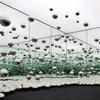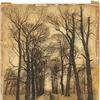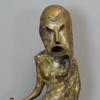First Major Art Museum Exhibition Dedicated to World-Renowned Photographer Michael Nichols to Open in Philadelphia
- PHILADELPHIA, Pennsylvania
- /
- March 13, 2017
This summer, the Philadelphia Museum of Art will present the first major exhibition—Wild: Michael Nichols—of the work of one of the world’s leading photographers. Keenly interested in the conservation of wildlife habitat, Nichols has collaborated with scientists on groundbreaking projects about great apes, elephants, and big cats, as well as the landscapes of Africa’s Congo Basin and the American West. In this in-depth survey, his photographs will be presented along with paintings, sculpture, and other media selected from the Museum’s collection to demonstrate the enduring importance of the wild—those parts of our world that remain untouched by humankind—as a subject for artists across time, offering a unique context in which to understand and appreciate Nichols’s remarkable work. The exhibition coincides with the first biography about the artist, A Wild Life: A Visual Biography of Photographer Michael Nichols, authored by exhibition co-curator Melissa Harris and published by Aperture.
Timothy Rub, The George D. Widener Director and CEO, said: “We are delighted to share Michael Nichols’s photography with our audiences and to bring his extraordinary images of animals in the wild and their habitats into a provocative dialogue with works from our collection. It will invite our visitors to consider how artists have understood the ancient and complex relationship between man and nature, and how they have represented the idea of the ‘wild’ throughout the history of art.”
Nichols has always approached the photographing of his subjects with great imagination, using innovative camera trap work and other technology in service of his goal: to photograph the wild without disturbing it, a strategy he calls “not being there.” However he captures his subjects, Nichols insists on being transparent about his methods so that viewers may understand the process.
Wild will be organized around two themes that have preoccupied Nichols throughout his career and that form the titles for two of his book projects, Brutal Kinship (1999) and The Last Place on Earth (2005). Brutal Kinship explored the relationship between humans and chimpanzees documenting chimps in captivity, in sanctuaries, and in the wild. Nichols and primatologist Jane Goodall argued that our complex dealings with chimps offer a framework for understanding our interactions with wild animals and places. In The Last Place on Earth, Nichols documented scientist Mike Fay’s trek across the Congo Basin—the largest untouched area on the planet—recording its rich biodiversity. An image of surfing hippos in Gabon from The Last Place on Earth was included in Time magazine’s “100 Most Influential Images of All Time” and will be among the photographs on view.
Wild will extend into other spaces throughout the Museum, and into the Great Stair Hall, where visitors will encounter Nichols’s groundbreaking images of a coastal redwood and a giant sequoia. Reproduced on 60-foot banners—the largest prints the artist has yet made—they constitute portraits of these monumental trees as extraordinary entities.
The exhibition is co-curated by Peter Barberie, the Museum’s Brodsky Curator of Photographs, and Melissa Harris, author of the new biography of the artist. Barberie noted: “Not only are we celebrating Nichols’s extraordinary achievement as a photographer and storyteller, but also because his activism to preserve the wild is at the heart of his work, the juxtapositions of his photographs with artworks from our collection will enable visitors to reflect on humanity’s ever-changing relationship with nature and our relatively new role as its stewards.”
Melissa Harris said: “Having worked with Nick on his books since the 1990s, and on this biography for the past five years—joining him and his team in the Serengeti and Yellowstone, as well as in his hometown of Muscle Shoals, Alabama—it is wonderful to experience his photographs in this larger context. Artists working in all media have often felt compelled to explore man’s often fraught relationship with the natural world. It is thrilling to see his images in dialogue with selected works from the Philadelphia Museum of Art’s brilliant collection—work that speaks so eloquently to the essence of wild.”







![Peter Paul Rubens (Flemish, 1577–1640), After Titian (Tiziano Vecelli) (Italian [Venetian], c. 1488–1576), Rape of Europa, 1628–29. Oil on canvas, 71 7/8 x 79 3/8 in. Peter Paul Rubens (Flemish, 1577–1640), After Titian (Tiziano Vecelli) (Italian [Venetian], c. 1488–1576), Rape of Europa, 1628–29. Oil on canvas, 71 7/8 x 79 3/8 in.](/images/c/e2/2e/Jan20_Rape_of_Europa100x100_c.jpg)





![Offering a Truce [Bested], 1895, is estimated to sell for between $1,300,000 and $1,800,000 on March 22, 2014, for The Russell: An Exhibition and Sale to Benefit the C.M. Russell Museum. Offering a Truce [Bested], 1895, is estimated to sell for between $1,300,000 and $1,800,000 on March 22, 2014, for The Russell: An Exhibition and Sale to Benefit the C.M. Russell Museum.](/images/c/a8/20/Dec10_Offering_a_Truce__Bested_300dpi100x100_c.jpg)
